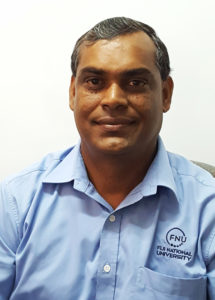Conference Home
Topic Overview
Conference Invitation
Conference Program
Speakers’ Bios & Abstracts
Sir John Crawford Address
Fees & Registration
Conference Scholars
Conference Sponsors
Conference Media |
Conference Speakers
Mr Salesh Kumar
Research Associate, School of Agriculture and Food Technology, Faculty of Business and Economics, University of the South Pacific
 Salesh Kumar is working as a lecturer at the Fiji National University in the College of Agriculture, Fisheries and Forestry, based in Koronivia, Nausori, Fiji. He is undertaking his PhD at the University of the South Pacific under the University of the South Pacific—ACIAR scholarship program. His research focus is postharvest handling practices of high value horticultural crops along the value chains in Fiji, under the guidance of Professor Steven Underhill, University of the Sunshine Coast, Australia. Salesh Kumar is working as a lecturer at the Fiji National University in the College of Agriculture, Fisheries and Forestry, based in Koronivia, Nausori, Fiji. He is undertaking his PhD at the University of the South Pacific under the University of the South Pacific—ACIAR scholarship program. His research focus is postharvest handling practices of high value horticultural crops along the value chains in Fiji, under the guidance of Professor Steven Underhill, University of the Sunshine Coast, Australia.
Salesh has attended a conference and published articles originating from his ongoing postharvest research work. He has accumulated considerable experience in the agricultural sector having worked for the Fijian Ministry of Agriculture for over 15 years. He is currently involved in an ACIAR-funded tropical fruit project with postharvest work to commence in Fiji, Tonga and Samoa.

Abstract
Poor produce quality and inconsistent supply currently impede smallholder vegetable growers in Fiji from accessing high-value domestic markets. The available produce destined to markets is further wasted due to poor post-harvest handling practices, road conditions and absence of a cool chain. The increasing importance of food and nutritional security in view of climate change factors affecting Pacific Islands Countries intensifies the need to reduce horticultural food loss. Post-harvest losses were measured from harvest through to product arrival at the Suva municipal fruit and vegetable markets, with post-municipal market losses determined using simulated storage conditions. In this study, 32.9% of the harvested product was removed from the commercial supply chain. Poor temperature management during on-farm product ripening and limited on-farm post-harvest hygiene were key contributors to the observed loss.
Contrary to expectations and comparable studies in other less developed countries, the losses due to transportation to municipal market were low (0.1%). While we found negligible in-transit physical damage to the product in the case study, this does not imply that existing road infrastructure is not an issue in Fiji, or that post-harvest quality is not adversely influenced by in-transit conditions. A significant number of high intensity vibration events were recorded along the transport chain, most of which were restricted to a relatively small portion of the western bank Sigatoka Valley road. The small losses post-farm gate (in transport or at the market) are due to fast-to-market transport over relatively short distances and fast on-selling, involving few intermediaries, once at the market. |



 Salesh Kumar is working as a lecturer at the Fiji National University in the College of Agriculture, Fisheries and Forestry, based in Koronivia, Nausori, Fiji. He is undertaking his PhD at the University of the South Pacific under the University of the South Pacific—ACIAR scholarship program. His research focus is postharvest handling practices of high value horticultural crops along the value chains in Fiji, under the guidance of Professor Steven Underhill, University of the Sunshine Coast, Australia.
Salesh Kumar is working as a lecturer at the Fiji National University in the College of Agriculture, Fisheries and Forestry, based in Koronivia, Nausori, Fiji. He is undertaking his PhD at the University of the South Pacific under the University of the South Pacific—ACIAR scholarship program. His research focus is postharvest handling practices of high value horticultural crops along the value chains in Fiji, under the guidance of Professor Steven Underhill, University of the Sunshine Coast, Australia.